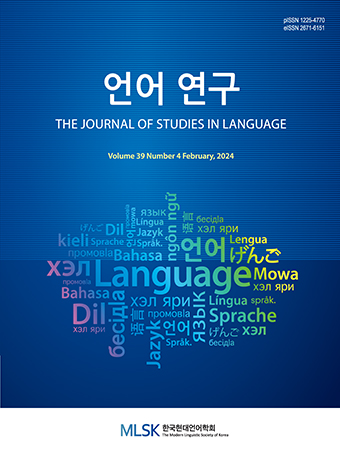Research Article
Abstract
References
Information
The first step of understanding speaker’s utterance is to comprehend what the speaker explicitly said. Just decoding linguistic elements has not been considered enough to understand the explicit meaning of utterances fully. The relevance theoretic term explicature sheds light on the way we interpret the explicit meaning of the speaker. In situations where speakers from different cultures communicate in a common language, deriving explicatures becomes more crucial and challenging. However, explicature is criticized that it appears to be hearer-centered by intercultural pragmatists. This paper aims to stipulate the nature of intermediate level of explicit meaning and then try to broaden the concept of explicature to ensure that hearers consider the speaker’s intersubjectivity and egocentrism in the process of explicature derivation.
- 정혜인. 2017. 외축을 통한 발화의 화용적 이해. 박사학위논문, 충남대학교, 대전.
- 정혜인, 이상철. 2017. 발화 의미와 외축 (Explicature).『언어연구』 32.4, 837-856. 10.18627/jslg.32.4.201702.837
- Ariel, M. 2002. The demise of a unique concept of literal meaning. Journal of Pragmatics 34.4, 361-402. 10.1016/S0378-2166(01)00043-1
- Ariel, M. 2008. Pragmatics and Grammar. Cambridge: Cambridge University Press. 10.1017/CBO9780511791314
- Borg, E. 2004. Minimal Semantics. Oxford: Oxford University Press. 10.1093/0199270252.001.0001
- Borg, E. 2016. Exploding Explicatures. Mind and Language 31, 335-355. 10.1111/mila.12109
- Borg, E. 2019. Explanatory Roles for Minimal Content. Noûs 53.3, 513-539. 10.1111/nous.12217
- Cappelen, H. and E. Lepore. 2005. Insensitive Semantics: a Defense of Semantic Minimalism and Speech Act Pluralism. Oxford: Blackwell. 10.1002/9780470755792 PMC1734208
- Carston, R. 2000. Explicature and Semantics. UCL Working Papers in Linguistics, 12, 1-44. Reprinted in Stephen Davis & Brad Gillon (eds.), 2004. Semantics: A Reader. Oxford: Oxford University Press.
- Carston, R. 2002. Thoughts and Utterances: The Pragmatics of Explicit Communication. Oxford: Blackwell. 10.1002/9780470754603 11964277
- Grice, H. P. 1989. Studies in the Way of Words. Cambridge, MA: Harvard University Press.
- Kecskés, I. 2004. Lexical Merging, Conceptual Blending, and Cultural Crossing. Intercultural pragmatics 1.1, 1-26. 10.1515/iprg.2004.005
- Kecskés, I. 2008. Dueling contexts: A Dynamic Model of Meaning. Journal of Pragmatic 40.3, 385-406. 10.1016/j.pragma.2007.12.004
- Kecskés, I. 2010. The Paradox of Communication: Socio-cognitive Approach to Pragmatics. Pragmatics and Society 1.1, 50-73. 10.1075/ps.1.1.04kec
- Kecskés, I. 2014. Intercultural Pragmatics. Oxford: Oxford University Press.
- Kecskés, I. and S. Assimakopoulos. 2017. Current Issues in Intercultural Pragmatics. John Benjamins Publishing Company. EBSCOhost, search.ebscohost.com.libra.cnu.ac.kr/login.aspx?direct=true&db=nlebk&AN=1529358 &lang=ko&site= ehost-live.Socio-cog. 10.1075/pbns.274
- Kecskés, I. and I. M. Cuenca. 2005. Lexical Choice as a Reflection of Conceptual Fluency. International Journal of Bilingualism 9.1, 49-69. 10.1177/13670069050090010401
- Kecskés, I. and F. Zhang, 2009. Activating, Seeking, and Creating Common Ground: A socio-cognitive Approach. Pragmatics & Cognition 17.2, 331-355. 10.1075/pc.17.2.06kec
- Keysar, B. and A. S. Henly. 2002. Speakers’ Overestimation of Their Effectiveness. Psychological Science 13.3, 207-212. 10.1111/1467-9280.00439 12009039
- Recanati, F. 2004. Literal Meaning. Cambridge: Cambridge University Press. 10.1017/CBO9780511615382
- Sperber, D. and D. Wilson. 1986. Relevance: Communication and Cognition. Vol. 142. Cambridge, MA: Harvard University Press.
- Sternau, M., M. Ariel, R. Giora, and O. Fein. 2017. “6. Deniability and Explicatures”. In Doing Pragmatics Interculturally. Berlin, Boston: De Gruyter Mouton.
- Wilson, D. and D. Sperber. 2002. Truthfulness and Relevance. Mind 111.443, 583-632. 10.1093/mind/111.443.583
- Publisher :The Modern Linguistic Society of Korea
- Publisher(Ko) :한국현대언어학회
- Journal Title :The Journal of Studies in Language
- Journal Title(Ko) :언어연구
- Volume : 36
- No :4
- Pages :511-524
- DOI :https://doi.org/10.18627/jslg.36.4.202102.511




 The Journal of Studies in Language
The Journal of Studies in Language






